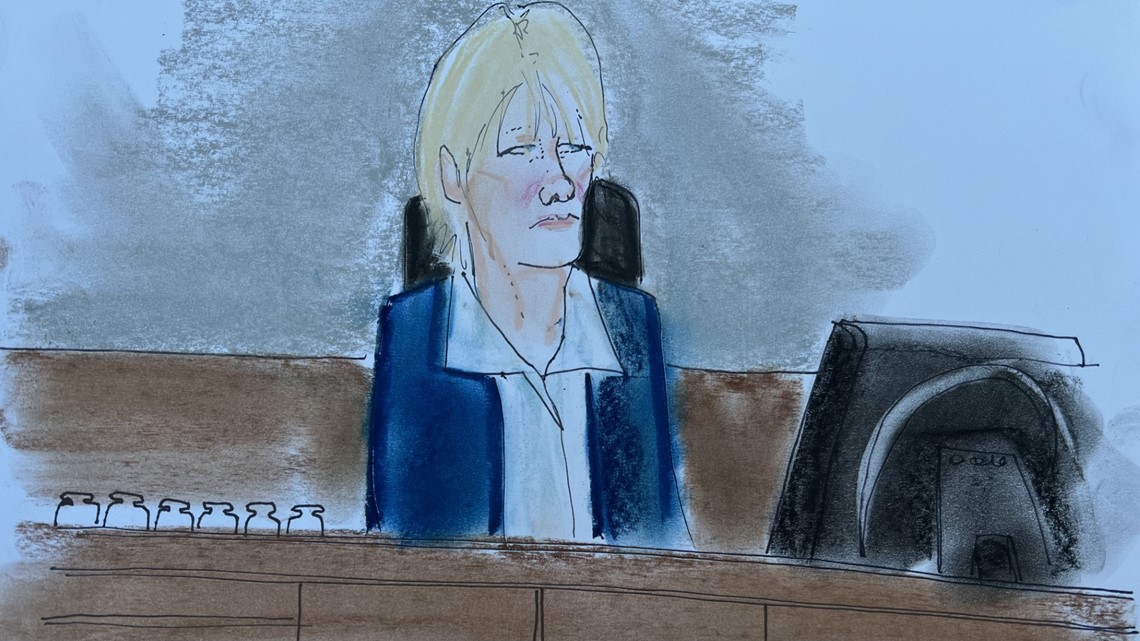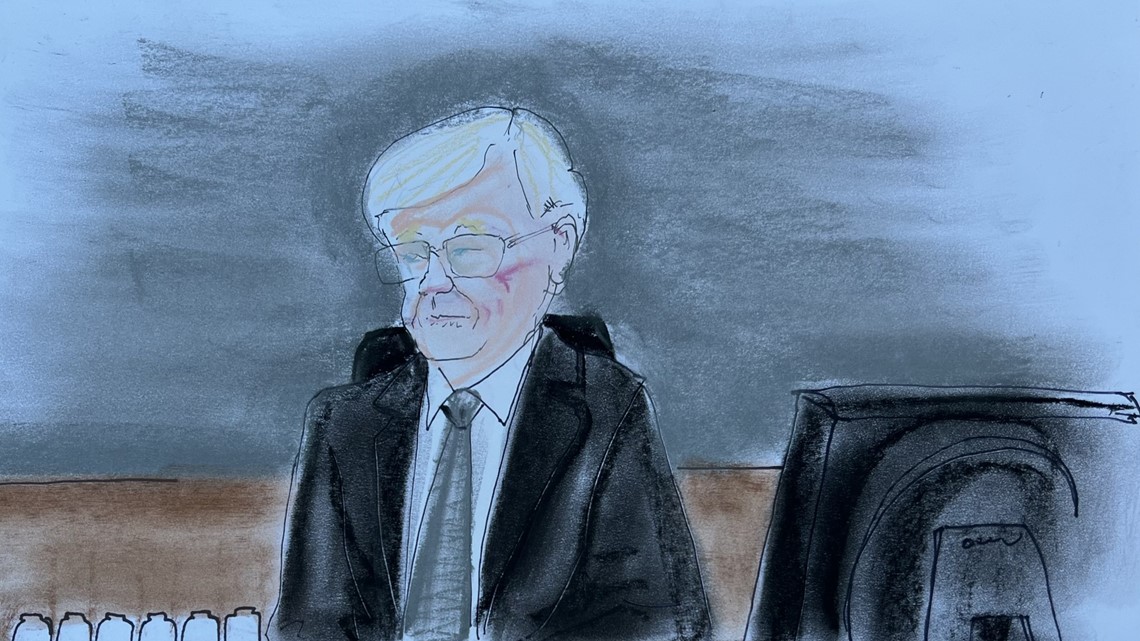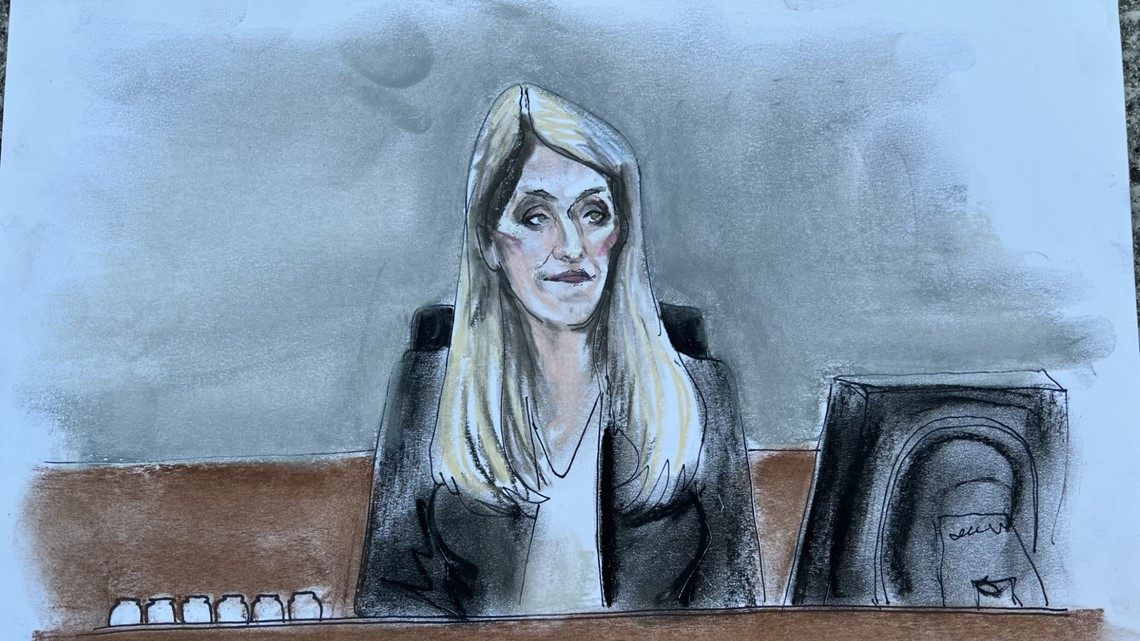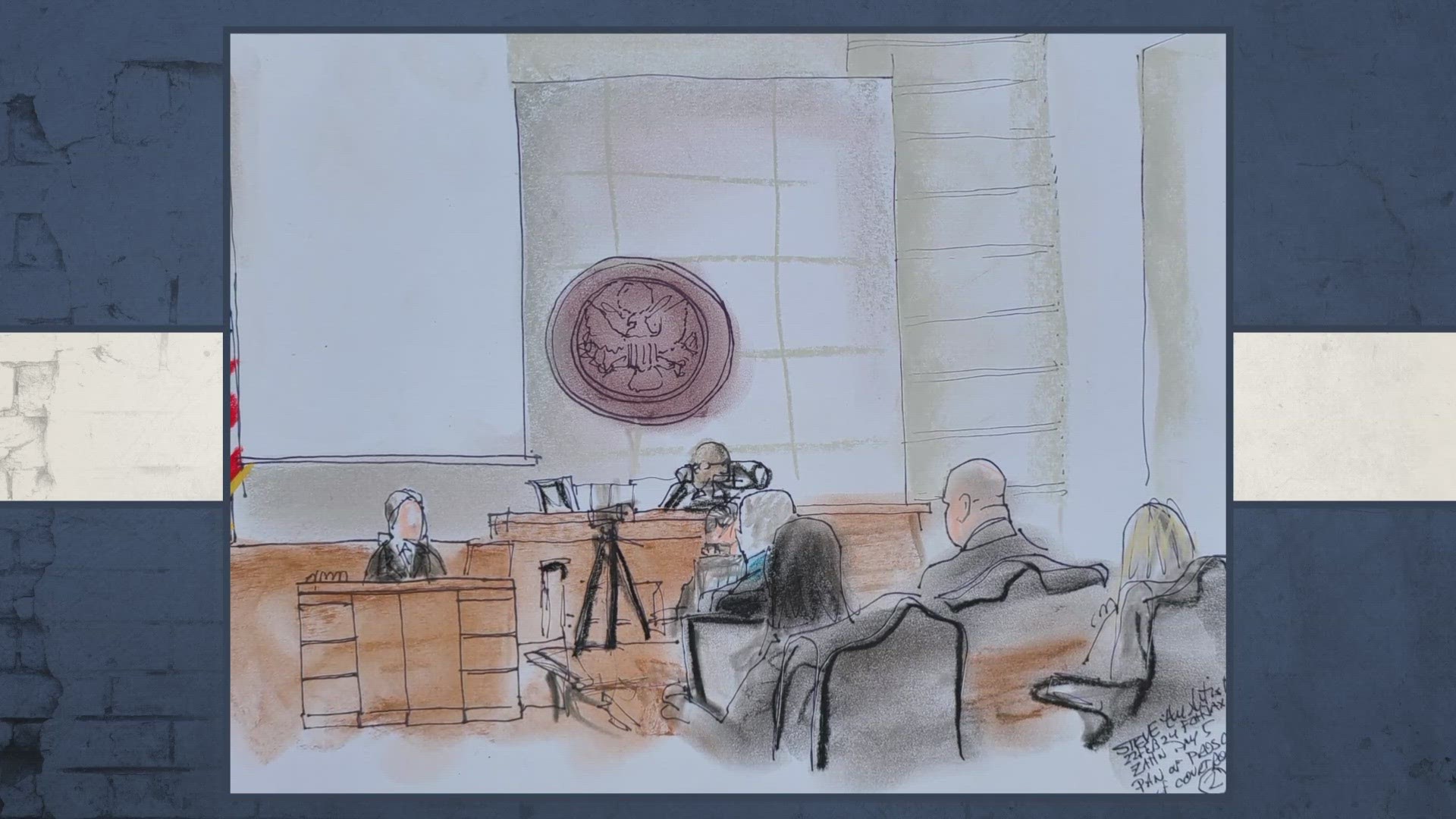JACKSONVILLE, Fla. — The JEA corruption trial, dubbed the "largest fraud case in Jacksonville history," entered into its second day Thursday.
Former JEA CEO Aaron Zahn and former CFO Ryan Wannemacher are accused of masterminding a plot to privatize the sale of JEA -- the largest public utility in the state of Florida -- and skim a profit off the top. Prosecutors say they "hoodwinked" officials in a scheme that could have stolen millions of dollars from Jacksonville taxpayers.
The assistant U.S. attorney representing the federal government and the defense attorneys for both Zahn and Wannemacher gave their opening statements Wednesday. Assistant U.S. Attorney Tysen Duva gave the first opening statement on Wednesday. He said Zahn and Wannemacher lied and deceived to steal millions.
"They were gonna walk out the back door with hundreds of millions of dollars in their pocket," Duva said.
On the other hand, Zahn's defense, led by Eddie Suarez, defended him as a "responsible CEO," a young upstart who was brought on to bring fresh ideas. He referred to Zahn as a "visionary leader," and said he was brought in to shake things up, which "ruffled feathers."
Wannemacher’s attorney began by presenting slideshows with pictures of board members, pictures of attorneys involved, the Office of General Counsel, the city auditors and virtually everyone involved in the case. He argued that Wannemacher could have had to fool all of these qualified people in order to pull off a scheme under their noses.
At the end of Day 1, the prosecution had begun its questioning of former CEO Paul McElroy, whose departure from JEA opened the door for Aaron Zahn's ascension. They resumed questioning him on Day 2.
Click here for a full recap of Day 1 of the trial.
At the end of the day, a video was shown foreshadowing Zahn's proposal of the plan at the heart of the corruption case. He says he would like to explore a "non-traditional" response to JEA's possible challenges. Videos of Zahn formally proposing the plan are expected to be shown Friday.
Below is a complete timeline of Day 2:
Day 2 Recap
- 9 a.m.: McElroy takes the stand again, the prosecution begins with a video of his resignation.
- 9:05 a.m.: McElroy testifies about the state of JEA. The state of JEA has been a consistent topic, due to Zahn, according to prosecutors and court documents, spreading rhetoric that JEA was facing financial turmoil and would need to commit mass layoffs to balance its finances.
- 9:10 a.m.: McElroy speaks on Zahn’s appointment: “I was surprised by the appointment, and somewhat disappointed.” He says that after his resignation, he severed all ties with JEA.
- 9:15 a.m.: McElroy testifies about his experience when he left the stand. “I think I could summarize (the financial state of JEA)…,” he said. He watched the April 2020 board meeting -- there was a presentation on the financial state of JEA. He was “surprised” to see how similar it was to when he left the board, with JEA in great shape financially. “I saw the same challenges” as when he departed in April 2018, he says.
- 9:18 a.m.: The prosecution steps down and the defense begins cross-examining.
- 9:22 a.m.: Zahn’s defense presents a report to McElroy, called a TYSP report, which forecasts the financial state of JEA.
- 9:26 a.m.: McElroy is questioned about his testimony in 2018 when he was CEO to a city council committee assigned to the sale of JEA and presented with several documents.
- 9:33 a.m.: After McElroy repeatedly is confused by these documents, the state objects to an email print out that was presented to McElroy, saying that there wasn’t foundation established that McElroy is familiar with these documents. The state then asked if there is evidence that McElroy has seen these documents before. McElroy believes that he has never seen this email or document before, it is from January 2020 and he was not working for JEA at the time. The lawyers meet with the judge to discuss this issue.
- 9:46 a.m.: Questioning begins again. Zahn's defense struggles with finding the exhibits he would like to question McElroy about. He is asked again about discrepancies between forecast reports and asked questions to establish the legitimacy and possible differences between reports.
- 9:50 a.m.: McElroy testifies that at the time he was CEO, JEA planned to create “zero growth,” but would continue to meet all financial obligations. This is again a contrast to the predictions on flyers that were distributed claiming that JEA was on the brink of collapse.
- 9:53 a.m.: Zahn’s defense presents a PowerPoint from March 20, 2018 that is called 'JEA Privatization Discussion Materials for Board of Directors Workshop.' The defense says they were charged with contributing to this PowerPoint in response to Tom Petway’s resignation, where he delivered what was referred to as a “mic drop” on privatization before he left.
- 9:58 a.m.: Zahn’s defense shows a PowerPoint slide called “JEA is Operating Near or At Peak Performance.” The defense then shows a slide that presents “risks and opportunities” that apply to the overall utilities market at the time (2018).
- 10 a.m.: Slide is shown showing “new market structures challenges,” and McElroy said that these slides show things that could present challenges.
- 10:03 a.m.: McElroy is asked about a chart showing “JEA Electric Sales Growth is a Challenge,” which shows projections beginning in 2006 and ending in 2017.
- 10:09 a.m.: The slide presented next is called "Electric Growth Has Been Sluggish (modest - flat - down)." McElroy testified that utilities companies are constantly having to figure out how to work around increases in energy efficiency. He is next asked about a slide that discusses increased battery production; he explains that batteries can be used at night to power solar and they are getting cheaper.
- 10:15 a.m.: McElroy is asked about different products and services he believed may impact JEA during his tenure. He says that changes in the costs of solar energy could be a benefit to JEA instead of a detriment by the time the costs of solar go down.
- 10:21 a.m.: For a second time, the defense attempts to present McElroy with video evidence and has “technical difficulties.”
- 10:30 a.m.: Brief recess.
- 10:45 a.m.: Questioning of McElroy continues. He continues to be questioned on presentations and reports on a possible privatization
- 11:12 a.m.: Zahn’s attorney asks if the PowerPoint showed was illustrating concerns about the future of utilities. McElroy said yes, and that the PowerPoint was intended to show what the industry in general was experiencing, but the concerns did pertain to JEA. He said the PowerPoint also talked about opportunities JEA had to grow.
- 11:19 a.m.: PowerPoint slide from 2013: “Conclusions from JEA Business Reality," saying JEA had a "dark cloud looming."
- 11:21 a.m.: McElroy is shown rating reports from 2005 and 2010 projecting “substantial growth” for a 10-year period of JEA. McElroy says he has never seen this document, but understands the content.
- 11:27 a.m.: The defense continues to show McElroy slides from financial reports on JEA. He says JEA believed at the time it could maintain on a positive trajectory by managing finances and costs.
- 11:34 a.m.: Wannemacher’s attorney has the opportunity to cross-examine McElroy. He asks about McElroy’s experience with the City Auditor’s Office and how public records laws work. McElroy says he understands that one-on-one meetings between board members do not need to be on public record, and it is typical to hold these meetings. McElroy is asked by the attorney about his opinion on Melissa Dykes, who was briefly interim CEO before Zahn. He says that he thought she was an appropriate choice due to her history of service.
- 11:38 a.m.: The prosecution (Tysen Duva) is given the opportunity to redirect. He asks McElroy about what he would have done in the event of financial turmoil at JEA: “If certain things didn’t happen, would you have to terminate 30% of the workforce?” He says no. “If certain things didn’t happen, would you have to stop contributions to the city of Jacksonville?” He says no. “Were you or were you not telling the board that you would have to raise customer rates by 26%?” He says no. This appears to be a direct response to plans that Zahn proposed during his time as CEO, to cut workforce numbers and decrease contributions to the city of Jacksonville if JEA did not make more money, such as through privatization.
- 11:40 a.m.: McElroy is asked about a 2013 report where he said a “dark cloud” was on the horizon, shown earlier. He then confirmed that he had said they would have to “work on it together.” McElroy says he did just that and explains how JEA worked to avoid a downfall.
- 11:44 a.m.: McElroy said their goal was to improve customer satisfaction and mitigate costs and JEA was able to do that, effectively refuting evidence the “dark cloud” line meant JEA would have been struggling by the time Zahn took the helm in 2018. He is asked again about if he ever proposed terminating the 30%, if he ever considered stopping contributions to the city of Jacksonville, or if he would have raised rates. He says no.
- 11:50 a.m.: McElroy’s testimony ends after five hours of questioning total.


Consulting attorney testifies
1 p.m.: Elizabeth Columbo, a consultant from Nixon Peabody, a firm that was consulted on the incentive plan, takes the stand. She says she believed there would be a conflict of interest within the Performance Unit Plan and told JEA that. After the board’s compensation committee reviewed the plan and asked for a draft to be reviewed, she was surprised that they were moving forward with and still concerned, she said.
- 1:16 p.m.: He asks her about a report on the JEA plan, which specifies that the attorneys who reviewed the plan were not from Florida and they are advising JEA to seek other attorneys. This points to Columbo, who is not licensed to practice in Florida and therefore discounts her opinion. She says that Wannemacher told her later on that JEA had received advice that the plan was allowed to proceed, and she received a memo from the Office of General Counsel that said as much. She says that the memo she received from the OGC did not change her mind about the program.
1:20 p.m.: The prosecution enters the letter from the OGC into evidence.1:23 p.m.: She is asked if she ever understood that the plan could make millions based on a memo she received. She says she did not analyze that because her job was to focus on the legality. She maintains that she did not feel it was wise to go forward and she didn’t believe it was legal.
1:24 pm.: Zahn’s attorney Eddie Suarez begins his cross examination. He asks Columbo when she first engaged with JEA, which she confirms to be March 22, 2019. She spoke with Joe Oranfo, who was the treasurer at the time, who wanted to discuss if the PUP plan could be legal.
1:27 p.m.: She testifies she spoke with Lynn Rhode, Herschel Vinyard and Wannemacher who asked if Nixon Peabody had labor lawyers with experience with long term incentive plans who may help draw up employment contracts. She met with those lawyers and they declined to participate.
1:31 p.m.: She met with Zahn, Wannemacher and Dykes to talk about the program. She said she had concerns that it couldn’t be done under Florida law. They asked her to draft a memo and “put it all in writing.” Suarez enters the memo into evidence. Columbo testifies that the memo indeed says it would be “prudent” for JEA to retain Florida counsel. (She is not licensed in Florida).
1:36 p.m.: Columbo testified that they indeed did seek the opinion of Florida lawyers and that the OGC issued the memo saying that the plan could move forward, which she has read.
1:41 p.m.: She is questioned about her firm’s interest in MEAG, a Georgia utility. JEA was suing them at the time. Her firm was representing both, so she told JEA in August 2019 that there was a conflict of interest. Suarez ends his questioning.
1:43 p.m.: Wannemacher’s attorney, Felman, begins his questioning.
1:46 p.m.: Columbo testifies that she met Rhode and Vinyard at a meeting in New York on April 10, 2019, and had not met them before. They discuss the timing of the meeting and her correspondence with Wannemacher afterward to set up a call. She is asked if she thought the plan “did not look good,” and she agrees to that. She says that at no point did she ever greenlight the plan, and she wrote up a memo dubbed the “no memo” where she explained this. She says there were no surprises in the memo and everything she said there had previously been communicated.
1:53 p.m.: Columbo testifies that she was asked to draft a document proposing the plan by the Office of General Counsel. She was “confused” that this was asked of her because she had advised this program shouldn’t move forward. The OGC said there was information to be considered that would clear up issues with the plan and they would provide her this information.
1:55 p.m.: Felman presented Columbo with a draft of the plan to look at on the stand. “If you wanted to do this math, could you have?” he asks. She says she could have. She is then asked if Wannemacher ever tried to “hide” math from her. She said he did not.
1:58 p.m.: Columbo is asked if she knew that other law firms had also reviewed the plan. She says not at the time, but she was sent copies of memos from them to read in 2020.
2:00 p.m.: Assistant U.S. attorney asks Columbo if anyone had ever mentioned a payout of hundreds of millions of dollars to her, she said she does not recall. She said that she did not see anything of this nature in the OGC memo, but she could not have figured out the potential amount of money to be paid if she didn’t have the necessary data.
2:01 p.m.: Columbo is asked if the conflict of interest issue with MEAG could have caused her termination. She says she cannot answer that, and leaves the stand.


Investigator with State Attorney's Office testifies
2:04 p.m.: John Zipperer, an investigator with the State Attorney’s Office takes the stand.
2:11 p.m: Duva begins questioning Zipperer.
2:14 p.m.: Zipperer testifies that State Attorney Melissa Nelson was asked to investigate the Performance Unit Plan by concerned citizens. He became tasked with talking to some of these people.
2:16 p.m.: Zipperer is shown a memo by City Council Auditor Kyle Billy explaining the plan and concerns, which he says he has examined before.
2:17 p.m.: He and his partner understood “some people were going to get very rich off the sale of JEA” based on Billy’s memo, he said.
2:18 p.m.: “The people we were speaking with were concerned that Mr. Zahn was going to become a millionaire” if the plan went through. End of questioning by Duva.
2:21 p.m.: Suarez begins questioning Zipperer, asking him to list city officials who contacted him. He mentions then-city council president Anna Brosche.
2:25 p.m.: Zipperer testifies he did not know when he received the memo that the plan had been recommended to be rescinded.
2:27 p.m.: Zipperer leaves the stand. FBI Agent Angela Hill takes the stand. Brief recess.


FBI Agent Angela Hill testifies
2:44 p.m.: Duva begins questioning Hill. She has been given special privileges to watch the entire case because she is the investigator, and therefore has seen earlier testimony. He asks her if she knows about the memo by Kyle Billy that was mentioned earlier, and she says yes and she spoke with Billy about this issue. Duva says they will elect to specifically discuss these conversations with Billy when he testifies.
2:49 p.m.: Prosecutors introduce a memo from JEA that shows potential “net proceeds to city after payment of performance unit” which shows profits up to $4.4 billion depending on JEA’s performance at the time this was implemented. Hill testifies the names of everyone they subpoenaed and interviewed, including Nexstara (parent company of Florida Power and Light). It has been previously reported that during Zahn’s tenure, employees believed was going to buy JEA as part of a “fix,” part of their initial suspicion about the administration under Zahn.
2:56 p.m.: Hill testifies that she was investigating the connection between JEA’s strategic plan and the performance unit plan. She confirms that the investigation centered around Zahn.
3:00 p.m.: Hill is presented with documents from a JEA workshop put together by Zahn in May 2019. There is an agenda item on the future of JEA. A page of one presentation from this workshop, created by then-CFO Melissa Dykes, says that JEA has a choice to “get bigger or die,” and discusses goals to restructure. Hill discusses other impacts of Petway’s “mic drop,” including the advent of the special city council committee on JEA to investigate the possibility of privatization and the value of JEA. She testifies that the value of JEA may have been up to $11 billion at the time.
3:13 p.m.: Prosecutors show an exhibit from JEA during Zahn’s tenure which says that if they kept everything the same, they would need an additional $1 billion from customers.
3:20 p.m.: An exhibit is shown which says that if 10% or more of JEA were to be sold, it would require approval by the city council and ultimately city referendum. As they go through exhibits, there is an emphasis on language and the amount of times “profitability” is mentioned. A presentation by JEA during Zahn’s tenure to the JEA Compensation Committee is shown; it says that JEA lost an average of $1.3 million a year from 2007-2017. The chart shows a slope downward from 2006. Hill notes that 2006 was JEA’s “highest year in sales in the history of the company.”
3:30 p.m.: Jurors are shown a recording of a JEA board meeting, where Anton Derkach from consulting firm McKinsey & Company presented, along with Zahn. Derkach would later appear at the June 25, 2019 meeting where Zahn presented what has been called his “death spiral” analysis of the company’s performance – the meeting where Zahn claimed that without profit coming into JEA — such as through a sale — they would have to lay off a quarter of employees. (Derkach testified at pre-trial hearings that he doesn’t not agree with that assessment, and is set to testify later in the trial.)
4:00 p.m.: A video of Zahn giving a talk during his time as CEO is played. He talks about ways you would want to improve a business: “You raise prices, you acquire new businesses, you acquire new products, you sell new products, you invest in R&D.. Does it sound familiar, like the things we’ve been doing for the past year?” He says JEA is paying their debt down and taking on new investments. He says that JEA is “one of the only utilities in the United States” asking how they can change to thrive in the future.
4:08 p.m.: Video shows Zahn at a board meeting, where he compares JEA to the “frog theory,” This was a common story that Zahn would tell, referencing the idea that if you gradually heat up water with a frog inside it, they will not jump out because they don’t know what’s going on. (This theory has been disproven in actuality.)
4:18 p.m.: Video is shown of Melissa Dykes talking to the board, talking again about loss of revenue from 2007-2017, which she blames on energy efficiency laws. She says that JEA needs to increase rates and decrease costs to offset this.
4:25 p.m.: Brief recess.


May 2019 board meeting shown
4:40 p.m.: A video of a presentation by Wannemacher at a May 2019 board meeting on behalf of the senior leadership team, is shown. He projects losses for JEA due to solar and other innovations. Wannemacher talks about homes in Jacksonville that have outfitted with solar and “don’t use JEA anymore.” He quotes JFK as a means to inspire change in the company.
4:45 p.m.: Zahn’s commentary at the board meeting is played for the jury. He lists companies that he believes have been outplayed by new innovations, making the board finish his sentences: “Hotels…” is answered with “airbnb.” “Taxis…” is met with “Uber.” He then tells an anecdote about Kodak failing to keep up with digital photography. (**Later in Thursday’s testimony, Zahn brought this up again, showing examples of ways that companies adapted and changed over time.)
4:54 p.m.: In a quote repeated with emphasis by the prosecution, Former JEA Chair April Green asks Zahn: “Provide us with options, as if there are no constraints.”
4:57 p.m.: Prosecutors present documents sent to them from the City Council Auditor’s Office that show the value of JEA, part of the “performance unit scratch sheet” spreadsheet that has been repeatedly referred to as evidence that Wannemacher knew the projected profits of the PUP plan. The page presented says that between 2017 and 2018, $4 billion were added to JEA’s book value.
5:15 p.m.: A video is presented of Dykes presenting from this same meeting. She presents a “traditional response” scenario that would need to be implemented if JEA lost significant amounts of money, which is demonstrated in a PowerPoint. She says they would have to cut a significant amount of employees — and this could include executives. She would propose in this scenario, that they would move out of Downtown Jacksonville to a cheaper building.
5:22 p.m.: Zahn responds to this presentation with his idea for a “nontraditional” strategic plan to rival the “traditional response.” He says he knows people think this plan is unacceptable, and he says that it still is a possibility. But, he says, there is a possibility for a non-traditional response, an “exciting” opportunity. In the video, he is shown playing a PowerPoint that is called “Why JEA is developing a ‘nontraditional strategic plan.”
5:26 p.m.: Court is out of session for the day. Prosecutors plan to spend much of Friday questioning Hill and then she will be cross examined by the defense.

